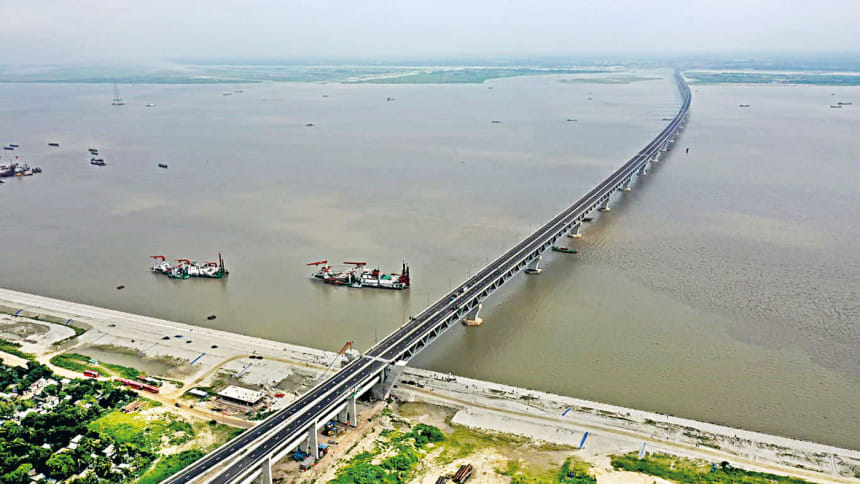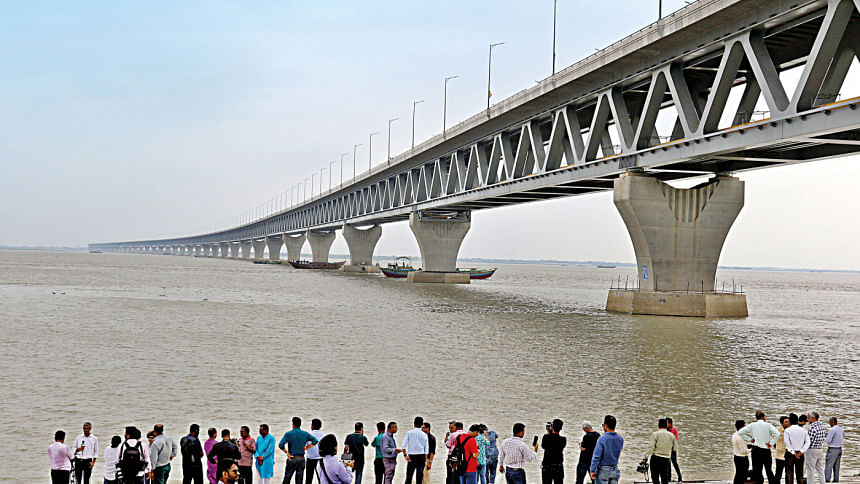Investment in the south is underwhelming even after Padma Bridge

Two years have passed since the inauguration of Padma Bridge, but the southern region has still not managed to tap the potential brought about by the mega-project due to a lack of physical infrastructure and utilities.
It was estimated that the Padma Bridge would increase Bangladesh's GDP by over 1 percent and benefit about three crore people across 21 southwestern districts. Unfortunately, although it has eased transportation over the Padma River, the region's contribution to the national economy has not picked up as expected.
According to the Bangladesh Investment Development Authority (BIDA), only 18 investment proposals have been registered in Khulna and Barishal over the past year. Around 13 proposals, involving Tk 1,248 crore, were registered in the Khulna region while five projects, involving Tk 92.7 crore, were registered in the Barishal region.

According to businesses and experts, the number of proposals and investments are below expectations.
"There was a potential to grow the GDP by more than 1 percent after the operationalisation of the Padma bridge. But fulfilling that potential requires a 'Padma plus' infrastructure development model," said Selim Raihan, executive director of the South Asian Network on Economic Modeling.
"There is no scope to think that investment will come on its own. Rather, the environment for investment must be created."
The 'Padma Plus' model includes the development of necessary infrastructure, including proper connecting roads, gas pipelines and other utility services, to facilitate investment.
Raihan, who has been engaged with a study on the economic impact of the bridge since the beginning of the project, said Barishal and Khulna needed more connectivity to encourage investors.
Although the Dhaka–Bhanga Expressway leading up to the bridge from Dhaka offers large multi-lane roads, once the bridge is crossed, the roads begin to narrow, before ultimately turning into largely two-lane roads.
He added that the government was yet to complete the work for land acquisition in order to start the development of the proposed economic zones in these regions.

Mohammad Nizam Uddin, president of the Barishal Metropolitan Chamber of Commerce and Industry, said not a single company has invested in the greater Barishal region in the past two years as banks are not interested in financing projects.
"Banks finance big industrial sectors in Dhaka, but do not want to take risks by financing industries in Barishal," he alleged, adding that there was a huge opportunity to invest in different sectors in the region, including shipbuilding.
According to Nizam Uddin, the only noticeable industries in Barishal consist of a pharmaceutical factory, a biscuit maker, and a shoe factory. Banks do not even want to lend to small and medium enterprises in the region, he claimed.
Jakaria Jalal, head of strategy (planning) at Bashundhara LP Gas, said the main barrier to setting up heavy industries in Khulna and Barishal was a lack of gas connections. "There is huge potential to develop industry in these regions if gas connections can be ensured for industries."
Although liquefied petroleum gas (LPG) is available, it is not viable for industries since it is two and half times more expensive than natural gas, he said, adding in the absence of gas connections, only power-based industries were feasible in these regions.
Abu Sayed Mahmud, assistant director of the BIDA's Barishal divisional office, said five companies have registered investment proposals in the region in the past year.
The proposals have come from Opsonin Bulk Drugs Ltd, Chemist Agro Biotic, Afia & Fatima Auto Rice Mill, Asfia Auto Rice Mill & Flour Mill, and Payra Recycling Plant.
These companies have registered with the BIDA for investment after the inauguration of the Padma Bridge, but they have yet to start operations.

He added that he was not aware of anybody seeking to secure permission to set up a large company in Barishal. "So, although it was expected, the industrialisation of Barishal failed to gather steam after the construction of the Padma Bridge."
In the division, 52 industrial establishments have so far received registration from the BIDA with combined investment plans of Tk 1,027 crore.
Saidur Rahman Rintu, president of the Barishal Chamber of Commerce and Industry, said industrialisation would not accelerate if gas is unavailable.
He demanded reducing the interest rate of bank loans and tax concessions. "We have already invested crores of taka in the shipping sector and have faced losses."
Right now, those who have invested in the waterways are facing huge financial losses as road connectivity has enhanced thanks to the opening of the bridge.
Businessmen said that they were not interested in investing in the region due to a lack of gas connections and connectivity.
Pronab Kumar Roy, director of the BIDA for the Khulna division, said although the Padma Bridge has been opened, industrialisation is yet to get momentum. Only some small and medium industries were being established, but not heavy industries.
Sharif Atiar Rahman, senior vice president of the Khulna Chamber of Commerce & Industry, said investors would not be encouraged to invest heavily until gas is made available for industries.
However, he said people in the Khulna region were benefiting as they can now take a round trip to Dhaka in just a single day, which was unimaginable before the Padma Bridge was constructed.
"People can now transport agricultural products and fish to Dhaka within three and a half hours."


 For all latest news, follow The Daily Star's Google News channel.
For all latest news, follow The Daily Star's Google News channel. 



Comments